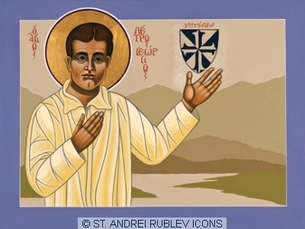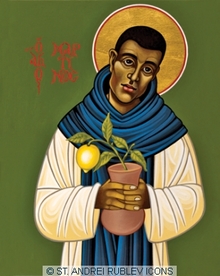 It is said that when St. Catherine of Siena was in dialogue with God during one of her ecstasies God said to her, "I am who am; you are she who is not." That is a most humbling statement for one to receive, to say the least. And for one who is now considered a Doctor of the Church it is amazing that God would say this to her. It seems as if God was trying to put things into perspective as to what the nature of their relationship really was. It seems that reflecting on St. Catherine could teach us all a little about what that statement may have meant for her, especially because this is her feast day. It seems like a shocking thing for God to have followed the statement, "I am who am," (which we know is how He identified Himself to Moses), with "you are she who is not." We know that God has always existed and that He has no beginning or end, even though that is a great mystery which we are unable to comprehend. Clearly St. Catherine existed, so to say she "is not" does not imply that she had no existence or that somehow God was banishing her from His thoughts. Nor was God telling her that she was unimportant in any way. Instead, He seemed to be reminding her that she needed to totally rely on Him. He is God and she is not. The source of her ministry was God, the source of her spiritual gifts was God, the source of her love was God, the source of her perseverance was God, the source of her life was God. In short, the source of all she was, was God. In many places in the Dialogues, (which is the book in which her conversations with God were recorded), God called St. Catherine, "My Daughter." Their relationship was both Father to daughter and Creator to creature, and she was aware of her ultimate reliance upon Him for everything. In fact, she was so close to God that at a time when she was concerned over some temptations she faced, she asked Him: "My Lord, where were you when my heart was so disturbed by all those temptations?" His response was: "I was in your heart." That is, God was there helping her to be displeased with the temptations so that she would be empowered against them. St. Catherine was what I would call a "gutsy" woman. That is, she was never one to shrink from difficult situations or hard work. She was independent in a time when women were expected to be dependent, standing up to her mother when she was forbidden to become a religious or associate with religious women, knowing that this was her vocation. Catherine stood up to the authorities of the day in order to help the poor. She stood up to the pope, telling him to get back to Rome during the time of the Schism in the church (when there were two popes at once, both claiming authority.) She stood up to the Queen of Naples when the Queen supported the anti-pope, sending a letter in which she did not mince any words. She did not even fear the plague, going into the most stricken areas of the city to help the sick and the dying. Yet St. Catherine was docile in her relationship with God, knowing that the source of all she had was in God and not in her own powers or abilities. She completely submitted her will to His in the intimacy of their relationship. She could hear Him say, "I am who am; you are she who is not" and understand that this meant that she needed Him to do even the smallest thing. She understood what our relationship to God should be: one of gratitude to the One who gives us all. She understood that He loves us more than anyone else ever could, therefore to be docile and willing to do His will was in the best interest of her soul. A loving parent or spouse will never ask us to do anything that is not in the best interest of our soul, even if it looks strange to the rest of the world. She trusted that and it was why she rose to such sanctity.  God will not call us to be another St. Catherine. He may ask us to do some things that are difficult, such as to speak out against an injustice, be it in our family, workplace, or community. He may ask us to work for the poor and ill, which may be a neighbor, or a stranger. He may ask us to be bold in living our faith as a witness to those around us. I doubt He will ask us to write the pope and tell him “what's what,” given that we have a very holy pope today! But we may be called to help others around us if we see they are turning to sinful ways. We may be called to do the corporal or spiritual works of mercy in order to bring others to Christ. The corporal works of mercy are found in Matthew 25. They involve feeding the hungry and clothing the naked; they are actions which we do to show our love by helping those in need. But the spiritual works of mercy are often overlooked. They, too, are meant to show our love, but they are more about the soul than just the needs of the body. They are:
This does not mean we are to go around in a sanctimonious way to tell people of their sins. Only the one without sin can do that, which excludes all of us, as we learn in the Gospel of John. Rather our good example, or a word of encouragement when someone does something good, can be a way to combat sinful behaviors. We may need to confront someone if the situation is one in which we are called to challenge, but it always should be done with the voice of love and compassion. We are never to set ourselves up as better than anyone else because we, too, are sinners. We are all sinners, but we are loved sinners, therefore the call is to help others with the humility to know we, too, need help from time to time. We do these spiritual works to help others who may be journeying away from God and away from His love, unwittingly. We are never to set ourselves up as "holier than thou." Not only is this a big turn off to others, but it simply is not true. This is what St. Catherine exhibited in her life. She was in need of God's help and relied on Him totally to do the work He called her to do. That humility is what enabled her to be holy.  Let us seek to let God be God and for us to be His disciples. When we are humble servants it is inviting to others. If we want them to come to know Jesus or to know Him better, we need to imitate that which is loving and compassionate in the Lord. If not, all we would be doing is highlighting the faults of others, as if we have none. Not only is that hypocritical, but no one wants to be around people who seem full of themselves. Sometimes being loving means being bold, but it is always done with love and kindness, not condescension. If we are simply ourselves, faults and failings and all, and humbly bring the Gospel with love to others, we may be as influential in helping them in finding God's love as St. Catherine was in her time. She said: "The human heart is always drawn by love." (Dialogue 26) Therefore, when God says “I am who am; you are she (he) who is not," He is saying that we need to rely on Him because He is the One from who all good things flow and He alone is Lord of the Universe. We are not God, but we are His children and His disciples. And we are the instruments of His love which the world needs in order for peace and justice to be done. May we be inspired by St. Catherine to be humble in our service, yet bold in our faith! May we be filled with the Holy Spirit so as to be loving and compassionate! May we be able to recognize that all that we are comes from our Heavenly Father who is the great I AM! And may we realize the love of the Father, the Son and the Holy Spirit which is given to us freely and without reservation, no matter who we are! Let us continue to meet in the Heart of I Am Who Am, upon whom we rely for everything. Peace! **The icons are all by Rev. William Hart McNichols. The first is The Name of God, Shekinah. It depicts the letters of the tetragrammaton, which consists of the words: I Am Who Am. It can be found at http://www.standreirublevicons.com/gallery.php?action=viewPicture&id=373 The second is Blessed Pier Giorgio Frassati, who was a Third Order Dominican and was devoted to St. Catherine. I picked this icon not only because I have a great devotion to him, but because he boldly stood up for justice throughout his short life. He was a champion of the poor, but also marched in many rallies in order to speak out against the ills of fascism. The icon can be found at http://www.standreirublevicons.com/gallery.php?action=viewPicture&id=282 The last icon is San Martin de Porres, another great Dominican saint. He was renowned for his humility and service. The icon and further information about Saint Martin can be found at http://www.standreirublevicons.com/gallery.php?action=viewPicture&id=371 Comments are closed.
|
Heart Speaks to Heart
|

 RSS Feed
RSS Feed

